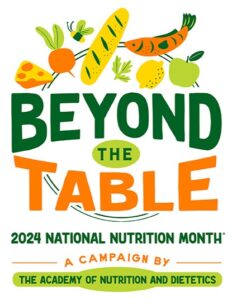What is National Nutrition Month®?

This March is National Nutrition Month, an initiative to encourage healthy eating and exercise habits. This annual campaign developed by the Academic of Nutrition and Dietetics highlights the education and importance of making informed nutritional choices.
Eating healthy and maintaining good nutrition lowers your risk for serious health problems. To celebrate National Nutrition Month, we are calling attention to how healthy eating can help existing conditions and prevent serious illnesses. We will also be sharing tips for healthy diet and nutrition.
Tips
It can be very difficult to know where to start when it comes to nutrition and healthy eating habits, so we are going to break it down to its basics.
For general healthy eating, it is key to focus on getting a variety of foods and nutrients into your diet. You can start by breaking down your diet into macronutrients: carbohydrates, proteins and fats.
Carbohydrates
The Dietary Guidelines for Americans recommends your diet consist of 45-65% carbohydrates. Carbohydrates are your body’s main source of energy. In their simplest form, all carbohydrates will break down into glucose in the body.
When you consume carbohydrates in isolation of other nutrients, you are more likely to experience a quick blood sugar spike and fall. This will leave you feeling hungry, unsatisfied and not energized. To prevent this, pair carbohydrates with protein, fat or fiber. This will slow down the release of sugar into the bloodstream and in turn keep your blood sugar levels balanced.
When you are choosing your carbohydrates, try sticking to unrefined or complex options. Whole grain bread, brown rice, whole fruits and vegetables, etc. will provide you with other nutrients such as fiber, vitamins and minerals that may process out in refined carbohydrate options. Unrefined carbohydrates are also less likely to contain added sugar.
Protein
The Dietary Guidelines for Americans also recommends your diet consist of 10-35% protein. Eating enough protein is essential for building and repairing your body’s muscles.
Common sources of protein to incorporate into your diet include eggs, reduced-fat milk, and lean varieties of beef, chicken, turkey and pork. There are also plenty of vegan and vegetarian protein options such as legumes, tofu, seeds and nuts.
Fats
Fats help our bodies to absorb essential vitamins and provide additional energy; though, it can be very difficult to know which fats to choose.
Generally, fats are broken down into saturated and unsaturated fats. The Dietary Guidelines for Americans’ healthy eating plan recommends you focus on foods that are low in saturated fats and instead choose unsaturated fats options. Lean varieties of meat and reduced-fat dairy products help to cut out some saturated fat.
Healthy unsaturated fat options include avocados, seeds and nuts, and olive, peanut and canola oils.
Additional Tips
- Try to find food options that are low in added sugar, sodium and cholesterol.
- Choose a variety whole fruits and vegetables that are varied sources of vitamins, minerals and fiber.
- Drink plenty of water.
- Restrict your alcohol consumption.
- Pair healthy eating habits with an exercise plan.
How healthy eating can help prevent serious illness
Evaluating and changing your eating habits is often one of the first steps recommended in bettering your health, especially if diagnosed with a serious illness. Following a balanced diet filled with nutrient-dense foods can support your immune system, which will assist your body in fighting off infections and recovering from illnesses.
Following healthy eating habits can prevent many common risk factors for serious illnesses, including high blood pressure and high cholesterol. Healthy eating habits can also allow you to more easily manage your weight, which is an additional risk factor for heart disease, diabetes and other serious illnesses.
It is also important to stay informed about your family’s history of serious illnesses to know if you are at a greater risk for developing a one. This way you can incorporate healthy eating and exercise habits, as well as other preventative measures, into your daily life to manage this risk.
Make sure to discuss all nutritional questions and seek advice from your primary health professionals, as they can tailor your plan to any health goals or conditions you have. Maxim Healthcare Services provides a range of home health and home care services. Contact your local office to learn more about Maxim’s services to get the support you need.



